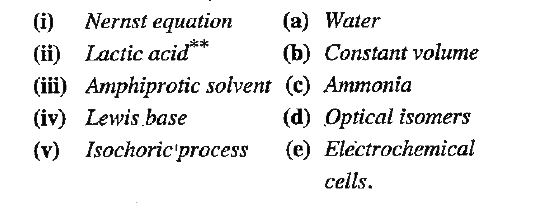Which of the following pair of molecules will have permanent dipole moment?
NO2andCO2
NO2andO3
SiF4andCO2
SiF4andNO2
The correct Answer is:B
To determine which of the given molecules have a permanent dipole moment, we need to analyze the molecular structure and electronegativity of the atoms involved in each molecule. The molecules in question are NO2, CO2, O3, and SiF4.
1. Analyze NO2 (Nitrogen Dioxide):
- The structure of NO2 is bent due to the presence of a lone pair on nitrogen.
- The electronegativity of oxygen is greater than that of nitrogen, leading to a dipole moment directed towards the oxygen atoms.
- Since the molecule is bent, the dipole moments do not cancel out, resulting in a net dipole moment.
- Conclusion: NO2 has a permanent dipole moment.
2. Analyze CO2 (Carbon Dioxide):
- The structure of CO2 is linear (O=C=O).
- The dipole moments from each C=O bond point in opposite directions.
- Since the molecule is symmetrical, the dipole moments cancel each other out.
- Conclusion: CO2 does not have a permanent dipole moment.
3. Analyze O3 (Ozone):
- The structure of O3 is bent (with one single bond and one double bond between the oxygen atoms).
- The dipole moment is directed towards the more electronegative oxygen.
- Due to the bent shape, the dipole moments do not cancel out, resulting in a net dipole moment.
- Conclusion: O3 has a permanent dipole moment.
4. Analyze SiF4 (Silicon Tetrafluoride):
- The structure of SiF4 is tetrahedral.
- The dipole moments from each Si-F bond point towards the fluorine atoms.
- Due to the symmetrical tetrahedral shape, these dipole moments cancel each other out.
- Conclusion: SiF4 does not have a permanent dipole moment.
Final Answer:
The pairs of molecules that have a permanent dipole moment are NO2 and O3.
- The structure of NO2 is bent due to the presence of a lone pair on nitrogen.
- The electronegativity of oxygen is greater than that of nitrogen, leading to a dipole moment directed towards the oxygen atoms.
- Since the molecule is bent, the dipole moments do not cancel out, resulting in a net dipole moment.
- Conclusion: NO2 has a permanent dipole moment.
- The structure of CO2 is linear (O=C=O).
- The dipole moments from each C=O bond point in opposite directions.
- Since the molecule is symmetrical, the dipole moments cancel each other out.
- Conclusion: CO2 does not have a permanent dipole moment.
- The structure of O3 is bent (with one single bond and one double bond between the oxygen atoms).
- The dipole moment is directed towards the more electronegative oxygen.
- Due to the bent shape, the dipole moments do not cancel out, resulting in a net dipole moment.
- Conclusion: O3 has a permanent dipole moment.
- The structure of SiF4 is tetrahedral.
- The dipole moments from each Si-F bond point towards the fluorine atoms.
- Due to the symmetrical tetrahedral shape, these dipole moments cancel each other out.
- Conclusion: SiF4 does not have a permanent dipole moment.
The pairs of molecules that have a permanent dipole moment are NO2 and O3.
Topper's Solved these Questions
- CHEMICAL BONDING (ADVANCED)BOOK - VK JAISWAL ENGLISHCHAPTER - CHEMICAL BONDING (ADVANCED)EXERCISE - Level 2
150 Videos
- CHEMICAL BONDING (ADVANCED)BOOK - VK JAISWAL ENGLISHCHAPTER - CHEMICAL BONDING (ADVANCED)EXERCISE - Level 3
77 Videos
- CHEMICAL BONDING (BASIC)BOOK - VK JAISWAL ENGLISHCHAPTER - CHEMICAL BONDING (BASIC)EXERCISE - SUBJECTIVE PROBLEMS
54 Videos
Similar Questions
Knowledge Check
Which one of the following pairs of molecules will have permanent dipole moments for both members?
ASiF4andNO2BNO2andCO2CNO2andO3DSiF4andCO2Match the following:
 AA and DBB and CCC and EDB and E
AA and DBB and CCC and EDB and E
Which of the following molecules will have polar bonds but zero dipole moment ?
View SolutionWhich of the following molecules will have polar bonds but zero dipole moment?
View SolutionWhich pair of moecules will have permanent dipole moment for both members ?
View SolutionWhich of the following molecule/molecules have zero dipole moment?
CO2,CBr4,BCl3,BeCl2
View SolutionWhich of the following compounds will have the highest dipole moment ?
View SolutionWhich of the following molecules have zero dipole?
View Solution
